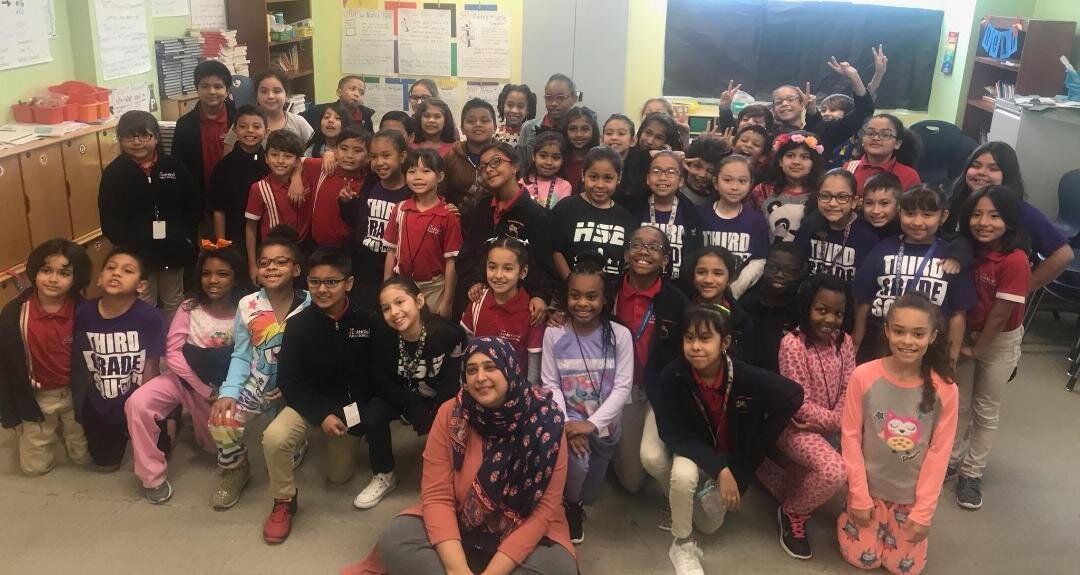Author Saadia Faruqi on Dispelling Myths + Stereotypes
This blog post is written by Kiran Khalid, a member of the APF Board of Directors.
“I could turn to stories to show how we’re more connected or the same, rather than different.”
This month the National Education Association is celebrating National Library Month. Part of that observance includes a new initiative that speaks to the backdrop of racial and ethnic tensions that have come to the fore in the past year.
“Reading Without Walls” is a challenge to readers by former National Ambassador for Young People’s Literature Gene Luen Yang to explore books about characters from different places and cultures, who look or live differently, as an inclusive way to spread appreciation and understanding for others.
This call to action is music to the ears of author Saadia Faruqi who has made promoting diversity at times of division her life’s work.
“After 9/11, I really wanted to do something and in the midst of that we moved to Texas,” Faruqi said from her home in Houston, Texas where she has resided since 2002. As a new immigrant from Karachi, Pakistan, Faruqi saw the instant backlash against Muslims. The pervasive sentiment sparked a passion to build interfaith dialogue. After helping to launch an interfaith book club at her local library, Faruqi began speaking to groups including churches and synagogues about Islam and Muslim culture.
She was leading what Oprah might call a “purpose-driven” life. In fact, O Magazine profiled her for just that in 2017, highlighting the cultural sensitivity training she led for the Houston Police Department. But after years of fighting stereotypes and dispelling myths, the mother of two young children was burned out.
“I realized that, even after a decade, people were asking the same questions. I got so disheartened because people were still saying that the Quran condones killing,” Faruqi said.
Discouraged but still determined, Faruqi shifted her strategy.
“I found I could do the same work but instead of presenting statistics and graphs to illustrate the truth, I could turn to stories to show how we’re more connected or the same, rather than different.”
Her first book, Brick Walls: Tales of Hope and Courage in Pakistan, published in 2015, was a collection of short stories about what life in Pakistan was really like. Other manuscripts followed but it was an exchange with her five-year-old daughter that led to her literary breakthrough.
“I was always trying to get her to read and I couldn’t understand why she wasn’t interested. I was a voracious reader and my son was, too,” Faruqi said.
Relentless in her pursuit to make an avid reader out of her reticent daughter, Faruqi didn’t let up.
“I remember she just turned to me one day, really annoyed, and said, ‘None of these people are like me. I don't want to read about them’ and I reminded her of the Katie Woo books, featuring a Chinese-American character, who was not like her that she enjoyed.” What her daughter said next was a moment of heartbreak and epiphany for Faruqi.
“Yeah, but she’s different and I’m different.” Faruqi recalls her saying. Her Pakistani-American daughter felt marginalized because she didn’t identify with the characters she was reading about.
“It was kind of just this realization that she needed something that wasn't there, and then when I did more research, I found out that there was a lack of representation, especially for Brown kids in that age group.”
Faruqi says President Donald Trump’s election, the Muslim ban and a perceived sanctioning of Islamophobia created an unprecedented opportunity. Publishers, anticipating a backlash, put out a call for Muslim authors.
“Editors, publishing houses and agents were looking for those stories as their activism. They were like, ‘OK, this is what we can do’.”
“Charismatic Yasmin faces challenges with intelligence and optimism, and the book is also noteworthy for showcasing Pakistani culture to children.”
Faruqi landed an agent and in 2018, her first children’s book, “Meet Yasmin” about a spirited second grader in a multigenerational Pakistani American family was published. Based on the author’s inquisitive daughter, it was an immediate hit. That’s how it started. Here’s how it’s going:
Yasmin is now a fan favorite among young readers. The series has appeared in many shortlists such as Book Riot’s 2019 “Best chapter books for kids,” that raved, “Charismatic Yasmin faces challenges with intelligence and optimism, and the book is also noteworthy for showcasing Pakistani culture to children.” National Public Radio included the Yasmin series in their 2020 list of favorite books.
To aspiring writers of Pakistani descent who worry that their stories have already been written in the growing genre of “desi lit”, Faruqi is pragmatic. “How many white people write vampire stories? You can write about the same topic because your style and perspective are uniquely yours. At the end of the day, a good story is going to be rewarded. Don’t get discouraged.”
Faruqi’s forthcoming novel is “Yusuf Azeem is Not a Hero” about a Muslim boy in a small Texas town, grappling with the specter of 9/11 as its 20th anniversary approaches.



